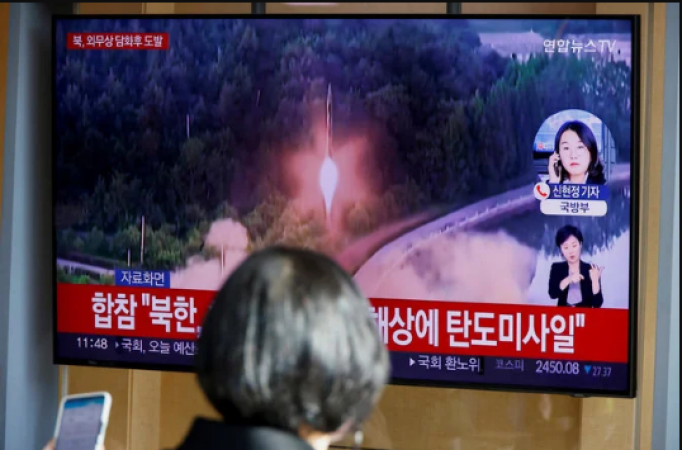
Seoul: North Korea launched a short-range ballistic missile on Thursday in a record-breaking flurry of launches, according to Seoul's military, as Pyongyang threatened the US and its regional allies with a "harsh" military response.
South Korea's Joint Chiefs of Staff reported that the military "detected a short-range ballistic missile fired from the Wonsan area of Kangwon province at approximately 10:48 a.m. (0148 GMT)."
The statement continued, "The military has increased surveillance and guard and is maintaining maximum readiness in close coordination with the US."
Also Read: Drug dealer detained in Syria is arrested in Italy
During the G20 summit in Bali, Indonesia, US President Joe Biden spoke with his Chinese counterpart Xi Jinping earlier this week about North Korea's recent missile tests.
After a flurry of missile launches fueled concerns that North Korea may soon conduct its seventh nuclear test, the US President urged China to use its influence to stop the reclusive regime.
On Sunday, Biden discussed with the prime ministers of Japan and South Korea how to deal with the threat posed by the North's "illegal weapons of mass destruction and ballistic missile programs," according to the White House.
North Korea's Foreign Minister Cho Son Hui condemned the talks on Thursday, saying they have "brought the situation on the Korean Peninsula to an unprecedented stage."
Choi said in a statement carried by state news agency KCNA that "the US 'offering extended resistance' and the daily increasing military activities of allied forces around the Korean Peninsula are foolish acts."
Military retaliation from the DPRK, as Cho refers to the North by its official name, "will come as Washington works to strengthen its security alliance with Tokyo and Seoul," he said.
Also Read: 8 billion people live on the planet which faces many problems
According to experts, Thursday's missile launch was timed to coincide with the foreign minister's statement on Pyongyang.
According to Cheong Seong-chang, a researcher at the Sejong Institute, the North fired the missile after issuing a statement hours earlier in an attempt to justify the launch "to send its message to the US and Japan."
North Korea launched several missiles earlier this month, including a barrage on 2 November in which Pyongyang fired 23 missiles, more than the entirety of 2017, the year of "fire and fury", during which Kim And was the US President. , Donald Trump, insulted.
The bombing occurred as hundreds of American and South Korean warplanes, including B-1B heavy bombers, took part in joint aerial exercises. North Korea has long reacted strongly to these drills because it views them as exercises for aggression.
According to experts, North Korea is taking advantage of the opportunity to conduct a restricted missile test, with the belief that it will avoid additional UN sanctions due to the UN standoff over Ukraine.
China and Russia joined in May to block a US-led effort at the UN Security Council to impose tougher sanctions on North Korea. China is Pyongyang's main diplomatic and economic ally.
In response to North Korea's missile tests that violate sanctions, Washington increased joint exercises with the South and sent a strategic bomber.
Experts believe that Pyongyang's self-imposed coronavirus blockade, which has been in place since early 2020, will reduce the effect of any external sanctions.
Cho Son Hui's ominous remarks and North Korea's most recent missile launch, according to Professor Leif-Erik Easley of Iwha University in Seoul, "are an attempt to signal that Pyongyang will not back down under international pressure."
Although China's Xi shrugged off his Covid-related isolation with a "relative charm offensive" at the recent G20 summit, he claimed it was clear that the summit of Biden, Yun and Kishida had focused on "trilateral coordination". concrete steps were taken."
Also Read: Judiciary: Iran hands down second death sentence over ‘riots’
According to Eastley, in the future, Chinese interests will support pressure on Pyongyang to deal with the alliance of the US, South Korea and Japan more strategically.